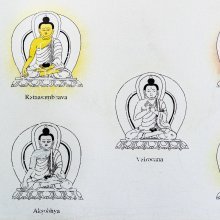Harita, Hārīta, Hārita, Hāritā, Haritā: 42 definitions
Introduction:
Harita means something in Buddhism, Pali, Hinduism, Sanskrit, the history of ancient India, Marathi, Hindi, biology, Tamil. If you want to know the exact meaning, history, etymology or English translation of this term then check out the descriptions on this page. Add your comment or reference to a book if you want to contribute to this summary article.
Harita has 42 English definitions available.
Images (photo gallery)
Languages of India and abroad
Sanskrit dictionary
[Deutsch Wörterbuch]
Source: Cologne Digital Sanskrit Dictionaries: Böhtlingk and Roth Grosses Petersburger WörterbuchHarita (हरित):—
--- OR ---
Hārita (हारित):—
1) adj. partic. praet. pass. vom caus. von 1. har; s. das. —
2) m. a) = hārīta eine Taubenart [Jaṭādhara im Śabdakalpadruma] [Brahmapurāṇa] in [Lassen’s Anthologie (III) 52, 1.] — b) patron. von Harita gaṇa vidādi zu [Pāṇini’s acht Bücher 4, 1, 104. 2, 4, 67, Vārttika von Kātyāyana.] [Mahābhārata 12, 9988.] [Harivaṃśa 758. 1463] (unter den Söhnen Viśvāmitra’s). pl. seine Nachkommen (sonst haritāḥ) [Viṣṇupurāṇa 369] nebst [Nalopākhyāna 3.] —
3) f. ā = haritā Bez. einer Svarabhakti Comm. zu [Taittirīyasaṃhitā] [Prātiśākhya 21, 15.] [WEBER,] [PRATIJÑĀS. 108.] — Vgl. kumāra .
--- OR ---
Hārīta (हारीत):—
1) m. a) eine Taubenart, Columba Hariola Buch. [Amarakoṣa 2, 5, 34.] [Hemacandra’s Abhidhānacintāmaṇi 1341.] [Anekārthasaṃgraha 3, 315.] [Halāyudha 2, 99.] [Medinīkoṣa t. 176.] [Mahābhārata 3, 11576. 13, 5500.] [Suśruta 1, 201, 20.] [VĀGBH. 1, 6, 48.] [Varāhamihira’s Bṛhajjātaka S. 48, 6. 86, 21. 88, 1. 15.] [morgenländischen Gesellschaft 27, 28.] [Mārkāṇḍeyapurāṇa 15, 26. 32.] [Weber’s Verzeichniss No. 897.] am Ende eines adj. comp. f. ā [Raghuvaṃśa 4, 46.] — b) Betrug [Hemacandra’s Anekārthasaṃgraha] [Medinīkoṣa] — c) Nomen proprium verschiedener Männer (eines Gesetzgebers, Arztes, Grammatikers) [Hemacandra’s Anekārthasaṃgraha] [Medinīkoṣa] [Āpastamba 1, 13, 10.] [Taittirīyasaṃhitā Prātiśākhya 14, 18.] Comm. zu [19. fgg.] [Yājñavalkya’s Gesetzbuch 1, 4.] [Mahābhārata 3, 986. 12, 1594.] [Bhāgavatapurāṇa 12, 7, 5.] [Weber’s Indische Studien 1, 30. 58. 232. fg. 391] (wohl richtiger hārita). [?467. Weber’s Verzeichniss No. 140. 322. 327. 941. 947. 952. 958. 975. 1017. 1028. Oxforder Handschriften 14,a, Nalopākhyāna 113,b,49. 150,b,43. 266,b,1. 34. fg. 268,a,24. 269,a,10. 271,a,14. 280,a,10. 291,b, No. 707. 310,a,14. 24. 311,b,41. 341,b, No. 799. 358,a,1. 23. 65. 68. WEBER, PRATIJÑĀS. 74. WILSON, Sel. Works 1,13. 299. HALL 203.] ein Sohn Ambarīṣa’s [Bhāgavatapurāṇa 9, 7, 1.] Viśvāmitra’s [16, 36.] Jābāli’s [KĀD.] in [morgenländischen Gesellschaft 7, 583.] — d) pl. das Geschlecht des Hārīta [Weber’s Verzeichniss 60, 36.] [Viṣṇupurāṇa 369,] [Nalopākhyāna 3.] Nomen proprium eines Volkes [Rāmāyaṇa 1, 55, 3.] —
3) f. ī a) Nomen proprium einer buddhistischen Göttin [WILSON, Sel. Works 2, 21. 33.] — b) hārītīputra pl. Nomen proprium eines Geschlechts [Weber’s Indische Studien 3, 485.] — Vgl. ku, bṛhaddhārīta, laghu, vṛddha .
Sanskrit, also spelled संस्कृतम् (saṃskṛtam), is an ancient language of India commonly seen as the grandmother of the Indo-European language family (even English!). Closely allied with Prakrit and Pali, Sanskrit is more exhaustive in both grammar and terms and has the most extensive collection of literature in the world, greatly surpassing its sister-languages Greek and Latin.
See also (Relevant definitions)
Starts with (+92): Harita Jataka, Harita manjari, Harita-manjiri, Harita-upabhokta, Haritaali-phool, Haritabandha, Haritabba, Haritabhadra, Haritabheshaja, Haritaca Jataka, Haritacarika, Haritacchada, Haritachada, Haritacharika, Haritachchhada, Haritachhada, Haritadhanya, Haritadharmashastra, Haritadi, Haritagarbha.
Ends with (+155): Abharabharita, Abharita, Abhicharita, Abhigharita, Abhipraksharita, Acharita, Adharita, Adhyacharita, Aharita, Akharita, Aksharita, Amtahspharita, Anabhigharita, Anaksharita, Anavadyacarita, Anirddharita, Anirdharita, Anucharita, Apacharita, Apaharita.
Full-text (+340): Haritaka, Shadaharita, Laghuharita, Haritashman, Hariti, Haritayana, Brihaddharita, Haria, Harini, Vriddhaharita, Hariya, Haritacchada, Haritopala, Cancu, Jambhan, Haritala, Hariti-putra, Yauvanashva, Harida, Campa.
Relevant text
Search found 97 books and stories containing Harita, Hārīta, Hārita, Hāritā, Haritā, Hārītā, Haritha, Harida, Haridha; (plurals include: Haritas, Hārītas, Hāritas, Hāritās, Haritās, Hārītās, Harithas, Haridas, Haridhas). You can also click to the full overview containing English textual excerpts. Below are direct links for the most relevant articles:
Rig Veda (translation and commentary) (by H. H. Wilson)
Garga Samhita (English) (by Danavir Goswami)
Verse 1.2.45 < [Chapter 2 - Description of the Abode of Śrī Goloka]
Verse 2.10.8 < [Chapter 10 - Description of Śrī Kṛṣṇa’s Herding the Cows]
Verse 5.13.19 < [Chapter 13 - The Arrival of Sri Uddhava]
Sahitya-kaumudi by Baladeva Vidyabhushana (by Gaurapada Dāsa)
The Vishnu Purana (by Horace Hayman Wilson)
Chapter III - Hymns of destroying the Nagas, origin of Sagara < [Book IV]
Legend of Paraśurāma < [Book IV]
Chapter XII - Lineage of Kroshtri, the son of Yadu < [Book IV]
Rivers in Ancient India (study) (by Archana Sarma)
6. Derivation of the term Nadī < [Chapter 1 - Introduction]
Bhakti-rasamrta-sindhu (by Śrīla Rūpa Gosvāmī)
Verse 3.1.22 < [Part 1 - Neutral Love of God (śānta-rasa)]
Verse 2.4.49 < [Part 4 - Transient Ecstatic Disturbances (vyābhicāri-bhāva)]
Related products


